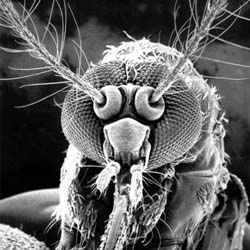Flightless Mosquitoes Generated To Control Dengue
 UC Irvine and British researchers have created a new breed of mosquitoes in which females cannot fly.
UC Irvine and British researchers have created a new breed of mosquitoes in which females cannot fly.
According to the researchers, the new breed may help control the spread of dandy fever.
Dengue fever results in dangerous flulike symptoms and is among the world's most urgent public health matters.
The dengue bug is spread via the bite of infected female Aedes aegypti mosquitoes, and there is no medicine or cure.
UCI scientists and fellow workers from Oxitec Ltd. and the University of Oxford produced the wingless females that are likely to die quickly in the wild, restricting the number of mosquitoes and reducing - or even eradicating - dengue spread.
Males of the strain can fly but do not bite or transmit the virus.
When genetically modified male mosquitoes mate with wild females and forward their genes, females of the next generation are not able to fly.
Researchers figured that if released, the novel type could sustainably restrain the native mosquito population in the period of 6-9 months. The approach offers a secure, resourceful option to harmful insecticides.
"Current dengue control methods are not sufficiently effective, and new ones are urgently needed," said Anthony James, Distinguished Professor of microbiology & molecular genetics and molecular biology & biochemistry at UCI and an internationally recognized vector biologist. "Controlling the mosquito that transmits this virus could significantly reduce human morbidity and mortality."
Study outcomes appeared in the early online version of the Proceedings of the National Academy of Sciences for the week of Feb. 22. (With Input from Agencies)